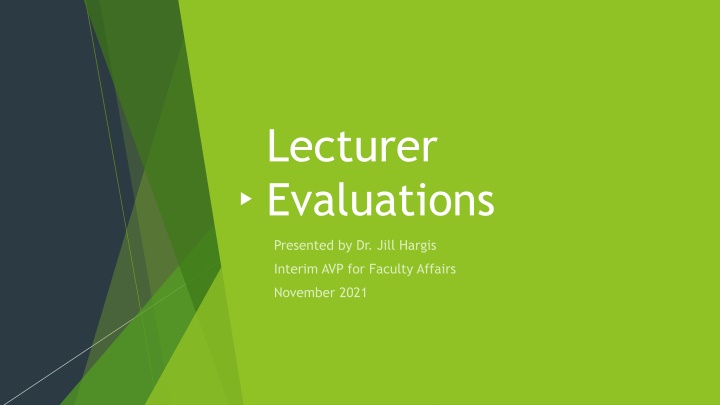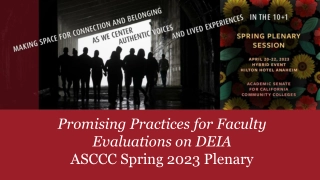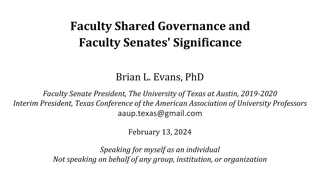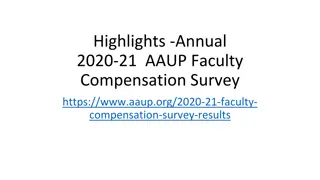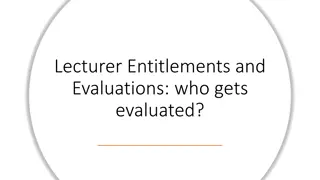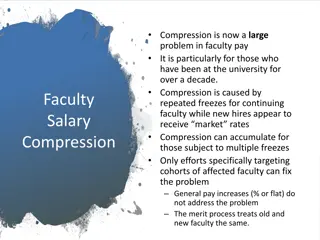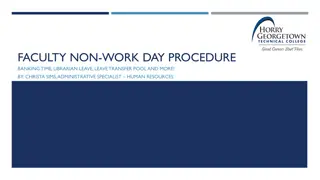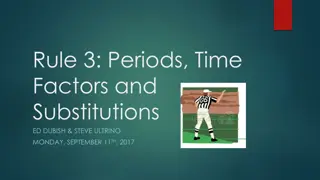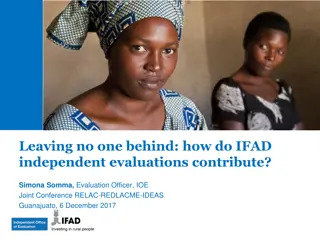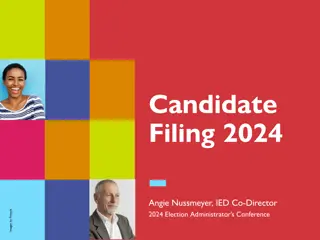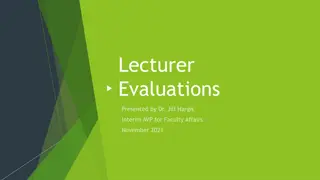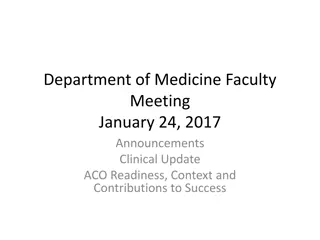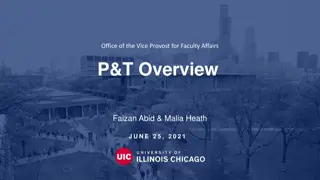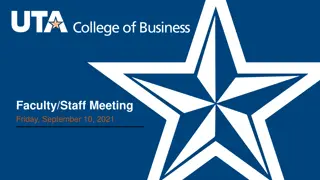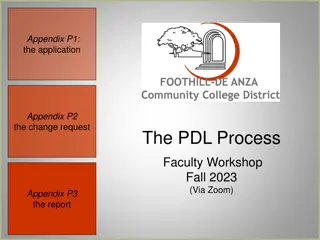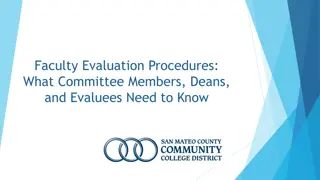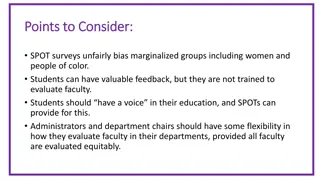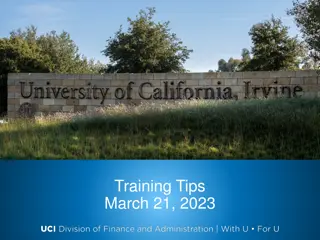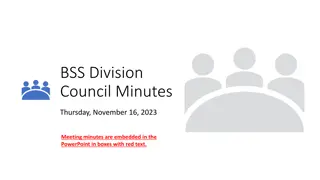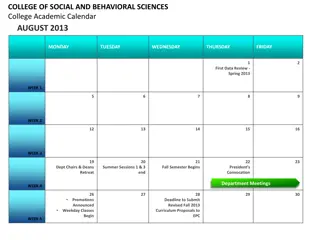Faculty Evaluations: Periods, Deadlines & Procedures
Annual and cumulative evaluations for temporary and tenured faculty are essential in the academic setting. Annual evaluations cover the past year's teaching activities while cumulative evaluations consider a longer timeframe. Deadlines and review processes are detailed in the evaluation calendar for the current academic year.
Download Presentation

Please find below an Image/Link to download the presentation.
The content on the website is provided AS IS for your information and personal use only. It may not be sold, licensed, or shared on other websites without obtaining consent from the author.If you encounter any issues during the download, it is possible that the publisher has removed the file from their server.
You are allowed to download the files provided on this website for personal or commercial use, subject to the condition that they are used lawfully. All files are the property of their respective owners.
The content on the website is provided AS IS for your information and personal use only. It may not be sold, licensed, or shared on other websites without obtaining consent from the author.
E N D
Presentation Transcript
Lecturer Evaluations
Annual evaluations - evaluations covering the preceding year. Cumulative evaluations evaluations covering the preceding 3 or 6 years. These evaluations end with an evaluation by the Dean. Definitions Temporary faculty not tenure-line faculty, also known as lecturers or adjuncts. TFEC Temporary Faculty Evaluation Committees. Tenured faculty, including FERP, elected by department probationary and tenured faculty. Minimum two faculty members.
What period of time do the evaluations cover? The period of time covered by annual evaluations is the preceding calendar year. Annual evaluations are due in the spring, but they cover teaching done in the preceding calendar year. This spring 2022, annual lecturer evaluations will cover teaching done in spring 2021 and fall 2021. The period of time covered by cumulative evaluations is the preceding 6 years for faculty eligible for the first 3-year entitlement, and the preceding 3 years for faculty eligible for additional 3-year entitlements. *Please let your lecturers know what period their evaluation will cover so they know what to include in the evaluation. They may also need to know how to get documents.
Office of Faculty Affairs ACADEMIC YEAR 2021-2022 Temporary Faculty (Lecturers) Evaluation Calendar Unit 3 Collective Bargaining Agreement (CBA) and University Policy #1336 Lecturer Evaluation Package Deadline Evaluation Reviewers Review Begins Review Deadline Rebuttal Deadline One-year reviews of part- time temporary faculty Evaluation period: calendar year 2021 TFEC* 3/1/22 4/4/22 4/14/22 3/1/22 Department Chair** 4/5/22 4/25/22 5/5/22 TFEC 3/1/22 4/4/22 4/14/22 3/1/22 One-year reviews of full- time temporary faculty Evaluation Period: calendar year 2021 Department Chair 4/5/22 4/25/22 5/5/22 Dean 4/25/22 5/13/22 5/23/22 TFEC 4/1/22 4/25/22 5/5/22 4/1/22 6 year cumulative review prior to first 3-year appointment Evaluation Period: 6 years*** DepartmentChair 4/26/22 5/13/22 5/23/22 Dean 5/24/22 7/6/22 7/16/22 TFEC 4/1/22 4/25/22 5/5/22 4/1/22 3-year cumulative review prior to subsequent 3-year appointment Evaluation Period: 3 years*** Department Chair 4/26/22 5/13/22 5/23/22 Dean 5/24/22 7/6/22 7/16/22 *TFEC: Temporary Faculty Evaluation Committee **Review by Department Chair only if Chair is not a member of TFEC. Without separate review by Chair, TFEC can follow the Chair Review deadline. ***The Dean/Director will review spring semester 2022 student evaluation results prior to deciding on issuing a 3-year contract.
Policy 1336 says: Any lecturer who does not have a 3-year entitlement, and who has taught at CPP for two semesters (even if non-consecutive), must receive an annual evaluation. 1. Who must be evaluated according to Policy 1336? a. Lecturers in this group who teach periodically must receive an annual evaluation for those calendar years when they teach. (This group is the most challenging for everyone to get the evaluations done.) After 6 years of consecutive employment with at least one semester in each year, a lecturer should receive a cumulative evaluation of those past 6 years. A satisfactory evaluation will result in a 3-year entitlement. (Article 12. CBA) 2. Lecturers with 3-year entitlements must be evaluated in the spring of their 3rd academic year appointment. 3.
Elements of the Periodic Evaluation Report 1. An updated curriculum vitae. 2. A self-assessment narrative including a teaching philosophy statement, not to exceed two pages. Not to exceed four pages if evaluation is prior to the award of an initial 3-year contract or its renewal 3. All peer classroom observations during the evaluation period. 4. Statistical summaries of student survey scores from the current evaluation period for all courses taught during the period of evaluation, as defined in Policy #1329. 5. Syllabi, exams, and other course materials for each different course taught during the evaluation period, as required by the department. 6. Any responses to written student input, as defined by Policy #1329, received by the department during the evaluation period. 7. For those with non-instructional assigned duties, include supplementary documents directly related to the assignment, as appropriate.
Department Lecturer Evaluation Criteria Must be given to all lecturers no later than 14 days after first day of instruction of the academic term. Link to criteria from Faculty Affairs: https://www.cpp.edu/faculty-affairs/temporary-faculty/lecturer-evaluation- criteria.shtml Revising department criteria documents clarify process, different roles, expectations
Peer Classroom Observations One peer observation per calendar year should be conducted unless otherwise decided by the department. Additional peer observations shall also be conducted upon the request of the temporary faculty member. This should be in the department evaluation criteria for temporary faculty to ensure all temporary faculty are treated the same. Requirement about peer observations should be explicit in the department evaluation criteria for temporary faculty to ensure all temporary faculty are treated the same.
Peer Classroom Observations contd When classroom visits are utilized as part of the evaluation, (according to department criteria) the individual faculty unit employee being evaluated shall be provided a notice of at least five (5) days that a classroom visit, online observation, and/or review of online content is to take place. There shall be consultation between the faculty member being evaluated and the individual who visits his/her class(es) regarding the classes to be visited and the scheduling of such visits. CBA 15.14
Best Practices: Evaluating faculty member sets up brief conversation with faculty member being evaluated to ask about goals, challenges, desire for input regarding any aspects of the course. Builds collegiality and sense of shared purpose for excellent teaching. Importance of class observations Policy requires a meeting to deliver the evaluation. Great opportunity to answer questions, clarify intent, hear the instructor s thoughts about the feedback, and discuss next steps.
Interfolio Demo Email to Lecturers with Link to their Case California State Polytechnic University Pomona has initiated a review on your behalf. VIEW CASE
